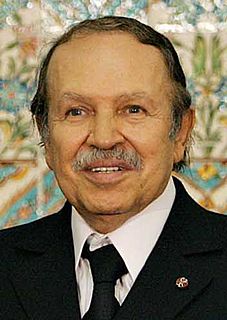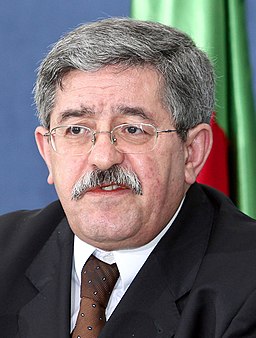
Politics of Algeria takes place in a framework of a constitutional semi-presidential republic, whereby the President of Algeria is head of state while the Prime Minister of Algeria is the head of government. Executive power is exercised by the government. Legislative power is vested in both the government and the two chambers of parliament, the People's National Assembly and the Council of the Nation. A legacy of Algeria's bloody War of Independence from France is a powerful military and security apparatus that put a high value on secrecy. Since 1988, parties other than the ruling FLN have been allowed and multiparty elections have been held, but freedom of political speech, protest and assembly is circumscribed, and the 2014 presidential election was boycotted by major opposition parties. Algeria has been called a "controlled democracy", or a state where the military and "a select group" of unelected civilians—reportedly known to Algerians as "le pouvoir" —make major decisions, such as who should be president.

The President of Algeria is the head of state and chief executive of Algeria, as well as the commander-in-chief of the Algerian People's National Armed Forces.

Abdelaziz Bouteflika, GColIH is an Algerian politician who has been the fifth President of Algeria since 1999. He was Minister of Foreign Affairs from 1963 to 1979. As President, he presided over the end of the bloody Algerian Civil War in 2002, and he ended emergency rule in February 2011 amidst regional unrest. He was the president of the United Nations General Assembly for a term in 1974.

The Democratic National Rally is a political party in Algeria. It is led by the Prime Minister Ahmed Ouyahia. The party held its Second Congress on 15–17 May 2003.

The National Liberation Front is a socialist political party in Algeria. It was the principal nationalist movement during the Algerian War and the sole legal and the ruling political party of the Algerian state until other parties were legalised in 1989.

Presidential elections were held in Algeria on 8 April 2004. Incumbent President Abdelaziz Bouteflika was re-elected with 85% of the vote.

Algeria elects on national level a head of state - the president - and a legislature. The president is elected for a five-year term by the people. People's National Assembly has 462 members, elected for a five-year term in multi-seat constituencies by proportional representation. Eight seats in the national assembly are reserved for Algerians abroad. The Council of the Nation has 144 members, 96 members elected by communal councils and 48 members appointed by the president. Algeriawesh alors has a multi-party system, with numerous parties in which no one party often has a chance of gaining power alone, and parties must work with each other to form coalition governments. According to a US Embassy cable, the 2009 presidential elections were "carefully choreographed and heavily controlled", with the official turnout figure "exaggerated" by at least 45%.

The Algerian Civil War was an armed conflict between the Algerian Government and various Islamic rebel groups which began in 1991 following a coup negating an Islamist electoral victory. The war began slowly as it first appeared the government had successfully crushed the Islamist movement, but armed groups emerged to fight jihad and by 1994, violence had reached such a level that it appeared the government might not be able to withstand it. By 1996–7 however it became clear that the violence and predation of the Islamists had lost its popular support, although fighting continued for several years after.

Parliamentary elections were held in Algeria on 26 December 1991. The first multi-party elections since independence, they were cancelled by a military coup after the first round after the military expressed concerns that the Islamic Salvation Front, which was almost certain to win more than the two-thirds majority of seats required to change the constitution, would democratically form an Islamic state. The annulling of the election led to the outbreak of the Algerian Civil War.

The People's National Assembly, abbreviated APN, is the lower house of the Algerian Parliament. It is composed of 462 members directly elected by the population. Of the 462 seats, 8 are reserved for Algerians living abroad. Members of the People's National Assembly are directly elected through proportional representation in multiple-member districts and serve terms lasting five years at a time. The last election for this body was held on 17 May 2017. This body and of the Algerian Parliament is seen as nonrepresentative of the Algerian people's interest because of the presidency, which controls the majority of governmental power. The minimum age required for election into the APN is 28.

Legislative elections were held in Algeria on 17 May 2007. 24 political parties and around 100 independent lists with a total of more than 12,000 candidates competed for the 389 seats in the National People's Assembly. While most Algerians voted on May 17, immigrants from Algeria to other countries and Algerians living in the Sahara and other nomads and semi-nomads voted on May 16 due to the distance from Algiers, the country's capital.

The 2002 Algerian Legislative election was held in Algeria on 30 May 2002 to elect members of the People's National Assembly. The governing National Liberation Front (FLN) won a majority of seats in the election. The election suffered from a low turnout, violence and boycotts by some opposition parties.

Constituent Assembly elections were held in Algeria on 28 September 1962, the first since independence in July. The Assembly was to have a one-year mandate to draw up and promulgate a constitution. A single list of 196 National Liberation Front candidates was put to voters to approve, 180 of which were Arabs and 16 of which were of European origin. A reported 99.7% voted in favour, with a turnout of 83.8%.

A constitutional referendum was held in Algeria on 26 November 1996. Held amidst the Algerian Civil War, the amendments would prohibit the use of Islam and ethnic identity in domestic politics. Despite calls for a boycott, the amendments were approved by 85.8% of voters with a 79.8% turnout. Parliamentary elections were held the following year.

A legislative election was held in Algeria on 10 May 2012. The incumbent coalition, consisting of the FLN of President Abdelaziz Bouteflika and the RND of Prime Minister Ahmed Ouyahia, held on to power after winning a majority of seats. The Islamist parties of the Green Algeria Alliance lost seats.

Presidential elections were held in Algeria on 17 April 2014. Incumbent President Abdelaziz Bouteflika was re-elected with 82% of the vote. Issues in the campaign included a desire for domestic stability after the bloody civil war of the 1990s, the state of the economy, the frail health of the 15 year incumbent and 77-year-old president whose speech was "slurred and inaudible" in his only public outing during the campaign, and the less-than-wholehearted support given the president by normally united and discrete ruling class.

Elections to the Algerian Assembly were held in Algeria in February 1951. Like other post-1948 elections in French Algeria, it was rigged by the authorities to ensure the defeat of Algerian nationalists.

Parliamentary elections were held in Algeria on 4 May 2017.

Presidential elections are scheduled to be held in Algeria on 18 April 2019.












